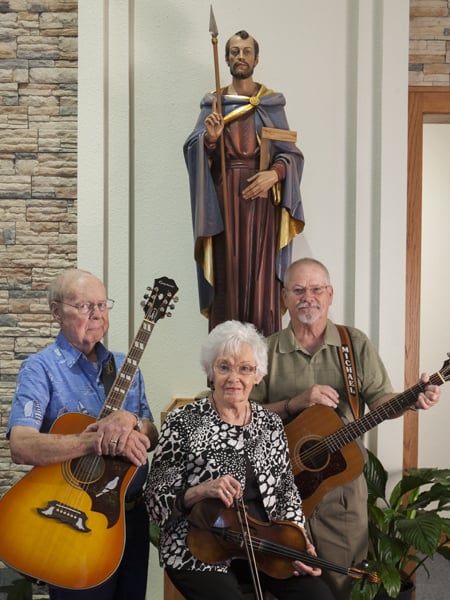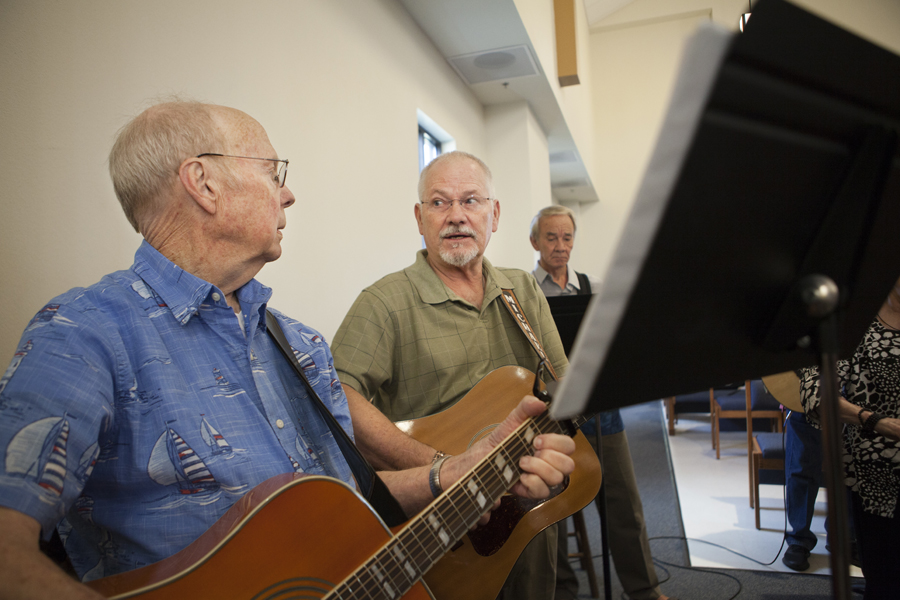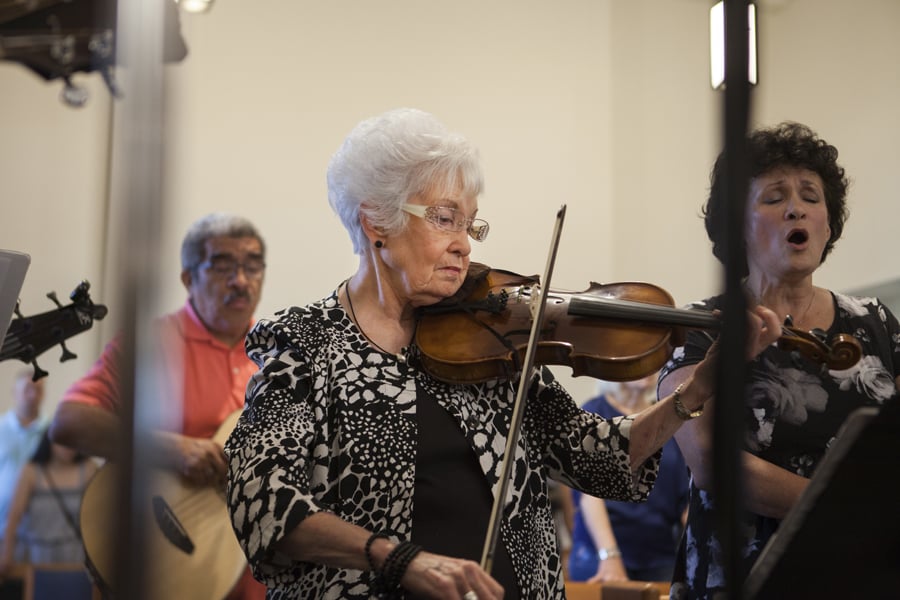Liturgy transforms over 50 years, but St. Thomas the Apostle choir keeps the beat
FORT WORTH — When Krista Hnizdo attends Sunday Mass at St. Thomas the Apostle Parish in Fort Worth, the songs performed by the parish’s contemporary choir lift her spirits and prepare her to hear the Word of God. One hymn, in particular, is a favorite.

As Eucharistic ministers ready to distribute Communion, vocalists lead the congregation in singing, “Sanctuary,” a melodic, prayerful hymn of devotion and thanksgiving.
“When I was holding my infants, I would sing it to them like a lullaby. They’re three-years-old now and know the words,” she said referring to twin girls, Sadie and Avery. “When I go to Mass at other churches, I miss it.”
Visitors to the faith community in northwest Tarrant County notice a similar enthusiasm. St. Thomas parishioners aren’t shy about making “a joyful noise unto the Lord.”
“They love to sing!” said Chuck Merrill, a lifelong member of St. Thomas who joined the choir as a 16-year-old. “It’s part of their worship.”
The native Texan — along with fellow bandmates Mike Wright and Jean Queppett — have spent every Sunday for the past 50 years sharing their musical talent with parishioners at Mass. Original members of one of the first parish-based folk groups in the diocese, they witnessed firsthand the changes that brought American folk music, and eventually contemporary Christian music, to Roman Catholic liturgies in North Texas.
Prior to Vatican II, attending Mass was largely a silent experience for worshippers. Choirs sang traditional hymns, usually in Latin, to the reverberating sound of an organ. The rest of the congregation sat quietly in the pews.
Liturgical revisions, mandated by Vatican II, not only allowed priests to celebrate the Mass in English (as well as other vernacular languages), they encouraged Catholics to participate more fully in church services. At the same time, folk music, by performers like Peter, Paul and Mary, Woody Guthrie, and Pete Seeger, became a popular genre especially among young people.

Chuck Merrill and Mike Wright look at each other while playing the guitar during Mass at St. Thomas the Apostle Parish in Fort Worth. (NTC photo/Jayme Shedenhelm)
Before long, congregations across the United States were introduced to the folk Mass. Songs like “Kumbaya,” with music provided by strumming guitars, beat-driven drums, and other instruments, became familiar part of Sunday morning gatherings.
By 1968, St. Thomas’ pastor was eager to implement Vatican II changes and the community innovated with a folk Mass, according to Merrill.
Invited by his brother-in-law, Rob Robertson, the teenage rhythm guitarist became part of a nucleus of musicians headed by Art Kline. Other talented parishioners — Wright, Queppett, her late husband, Buzz Queppett, Rob Ross, Mike Hibbs, and longtime Nolan Catholic High School teacher, the late Joe Kuban, formed a folk choir. Thursday evening practice sessions readied them to play at Sunday Mass.
But the melding of guitar chords with the autoharp, violin, and drums near the altar wasn’t a sound everyone embraced.
“What I remember is people walking out of church when we started playing. They didn’t like the change,” Merrill continued. “Art Kline always reminded us that it was never about performance. It was about aiding the congregation in liturgy.”
Jean Queppett and her husband attended their first “guitar Mass” at the University at Buffalo’s Newman Center in 1967 while living in Williamsville, N.Y. When the couple moved back to Fort Worth later that year, they were surprised to learn non-traditional Mass music was still an untried, unknown concept in North Texas.
Queppett, who began playing the violin at age six, still remembers the stares and scowls from parishioners when the folk Mass became a regular part of the Sunday schedule. Initially, the innovative Masses were held in the library.
“Parishioners were horrified that we were playing something that wasn’t traditional,” she recalled. “It was at the height of the folk music era but it was difficult for people, who had been Catholics forever, to accept the changes.”
Sunday regulars reacted strongly to one song in particular. “Good News” was sung to a melody based on an old Jewish folk tune.
“It started out slow than picked up and went faster,” the musician said, describing the distinctive tempo. “When people heard that, they would get up and leave. People probably complained but [the pastor] wasn’t one to pass on comments like that.”

Jean Queppette plays the violin during Mass at St. Thomas the Apostle Parish in Fort Worth. (NTC photo/Jayme Shedenhelm)
Despite the negative feedback from some parishioners, the new choir continued to perform more secular tunes at Sunday Mass like “This Little Light of Mine” and “Una Paloma Blanca.”
“We used popular songs that people could sing along to but put a different — more churchy — focus on them,” added Queppett, a convert who grew up attending spirited Baptist services. “None of us were professional musicians. We were just people who liked to sing, play, and enjoy music.”
It wasn’t long before curious Catholic parishes in the diocese, as well as other religious denominations, invited the St. Thomas folk group into their churches to perform.
“We got to be known around the area and would go to different churches,” remembered Rob Ross, the group’s original drummer who returned to the choir three years ago. “We visited the Lutherans, the Presbyterians, and Catholic parishes. I think what we were doing was seen as radical because of all the things going on in society at the time.”
When Cesar Chavez came to Fort Worth in 1969 to promote his grape boycott, members of the St. Thomas folk group marched with him outside a local supermarket then provided music at a Mass inside St. Patrick Cathedral.
Chavez, head of the United Farm Workers, spoke about the purpose of boycott at the Thanksgiving liturgy. The labor leader hoped to secure better wages for agricultural workers by persuading American consumers to stop buying grapes.
Security surrounding the controversial public figure was tight. Jean Queppett remembers someone snapping photos of everyone entering and leaving the cathedral.
“And they didn’t let us play certain instruments,” Ross recounted. “We couldn’t use the drums, bass, or violin and we didn’t understand why.”
Almost 50 years since participating in that slice of Fort Worth history, the choir is still a pivotal part of Mike Wright’s life.
“We’re like a little family,” said the self-taught guitarist who was 17 when he met fellow musician Chuck Merrill. “We do things together even when we’re not at Mass. We socialize. Our children are friends.”
Along with forming caring friendships, the music ministry nourished his faith.
“How could it not?” he asked. “It’s a labor of love. I wish more people would get involved. We need some younger members.”
During the past five decades, St. Thomas’ folk group experienced changes of its own. Guitars and percussion instruments at Mass are now commonplace but secular songs have disappeared from liturgies in favor of compositions with more sacred lyrics.
In December 2017, the parish moved to a new church building with different acoustics and more space for the choir and instruments.
The environment is different but the dedication of Merrill, Queppett, Wright, and other choir members continues to enhance Sunday Mass for St. Thomas parishioners.
“Music is a universal love. It’s soothing to our psyche and soothing to us as human beings,” Queppett explained. “When you combine that with the words spoken, the Mass becomes a more complete experience.”
